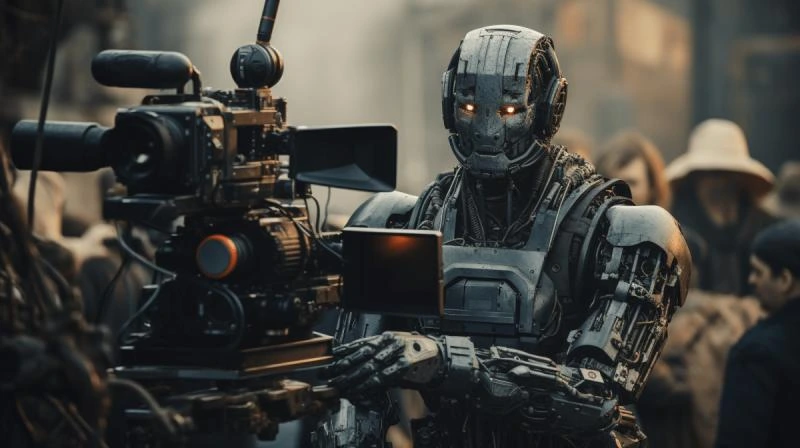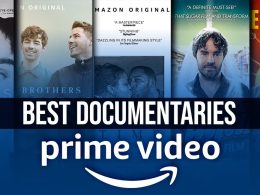Introduction
The film industry is evolving rapidly with the integration of Artificial Intelligence (AI). From streamlining movie production processes to enhancing audience experiences, AI is transforming every stage of filmmaking. This article explores how AI is being applied in the film industry, its benefits, challenges, and its future potential.
AI in the Film Industry
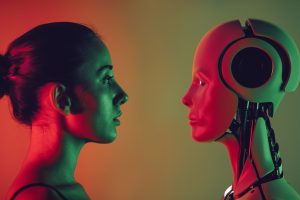
Artificial Intelligence has made its way into the heart of filmmaking. Filmmakers, producers, and even scriptwriters now use AI to boost creativity, improve workflows, and make better business decisions. AI tools can analyze massive data sets, predict trends, and personalize content, making it easier for the industry to cater to modern audience preferences.
AI and Film Preservation
AI is also being used for film preservation. Older films can deteriorate over time, but AI tools can help restore and preserve these classic movies. Machine learning algorithms can analyze damaged footage and suggest corrections. This not only helps maintain the quality of older films but also allows new generations to appreciate them.
The Role of AI in Film Distribution
AI also plays a big role in film distribution. Once a film is completed, studios need to decide how and where to release it. AI can analyze market data to determine the best platforms for a film’s release, whether in theaters, streaming services, or on-demand platforms. By understanding audience habits, AI helps studios maximize a film’s reach and profitability.
Scriptwriting and Story Development
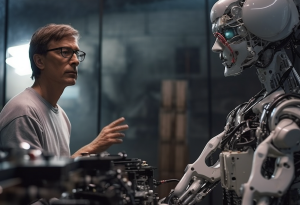
AI can assist with scriptwriting by suggesting story elements, character development, and plot twists. AI-powered tools, such as ScriptBook and AI Dungeon, analyze scripts for patterns and can even create new ideas based on previous hit movies. This saves writers time and provides fresh insights, though it cannot yet replace human creativity.
Pre-Production Planning
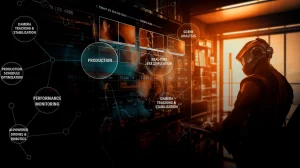
AI streamlines pre-production by predicting budgetary needs, scheduling, and even casting suggestions. AI tools like Cinelytic and Largo.ai analyze data from previous films to give accurate predictions of box office performance and help studios make more informed decisions on production investments.
Casting Assistance
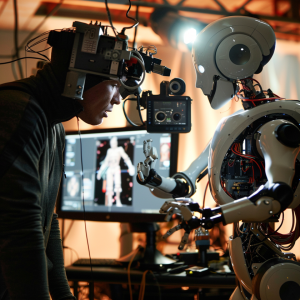
AI helps with casting by analyzing actors’ past performances and audience preferences. Casting directors can use AI to predict which actors are best suited for specific roles and will resonate with viewers. While it cannot fully replace human judgment, AI offers valuable insights, reducing casting errors and mismatches.
Animation and CGI Enhancement
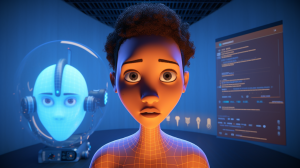
Animation studios use AI to generate realistic graphics and reduce time spent on complex CGI tasks. With tools like DeepMind’s AI and Disney’s Neural Network Animation, animators create lifelike characters and enhance special effects faster. AI simplifies repetitive tasks, such as frame rendering, allowing artists to focus on creative details.
Post-Production Editing
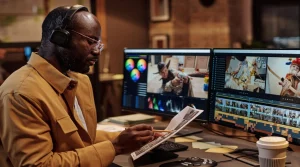
AI tools are transforming post-production by automating editing processes. Platforms like Adobe’s Sensei use AI for color correction, scene categorization, and even creating short trailers. This speeds up the editing process, allowing post-production teams to produce polished content in less time.
Personalized Marketing and Promotion
AI analyzes audience data to create targeted marketing campaigns. Tools like Netflix’s recommendation algorithm study viewer behavior and suggest content tailored to individual preferences. This personalized approach ensures that films reach the right audience, increasing viewership and revenue.
Casting the Right Talent with AI

Choosing the right actors for roles is crucial in filmmaking, and AI is making this process faster and more accurate. Using AI, casting directors can analyze an actor’s past performances, emotional expressions, and even facial features to find the best match for each role. This data-driven approach helps filmmakers select actors who are a great fit, making casting less subjective and more precise.
Enhanced Special Effects with AI

AI is advancing special effects in incredible ways, bringing movie characters and worlds to life with greater realism. AI tools can create lifelike animation, improve CGI (Computer-Generated Imagery), and add effects like aging or de-aging characters. These tools save time and make it easier to produce complex effects, which were traditionally more time-consuming and costly to create.
Editing and Post-Production Made Simple
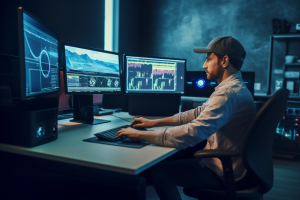
Editing is one of the most demanding tasks in filmmaking, but AI makes it faster and simpler. AI-powered editing tools analyze footage, suggest scene cuts, and even add music or sound effects. These tools can quickly identify the best parts of a scene, allowing editors to work faster and focus on creative choices rather than repetitive tasks. This speeds up the post-production process and ensures a high-quality final product.
Targeted Marketing with AI Insights

Once a movie is ready, marketing it to the right audience is key to its success. AI tools help filmmakers and studios create marketing strategies that target specific groups based on their viewing habits and preferences. By analyzing audience data, AI can suggest the best release dates, locations, and promotions to ensure maximum reach. This data-driven approach to marketing makes advertising more efficient and effective.
Balancing Creativity with AI

While AI brings many benefits to filmmaking, it also raises concerns. Some worry that relying on AI could limit creativity, as AI tools often work by analyzing patterns and trends. Filmmakers need to balance the efficiency of AI with human creativity to keep storytelling unique and fresh. AI should serve as a tool to support filmmakers, allowing them to focus on creating stories that are both innovative and impactful.
Enhancing Viewer Experience
In addition to production and marketing, AI is improving how audiences experience films. For instance, some streaming platforms use AI to create personalized playlists and suggestions based on viewers’ past choices. This makes it easier for viewers to find content they will enjoy, leading to higher satisfaction and engagement.
Training and Education
As AI becomes more common in the film industry, training and education for filmmakers are also changing. Film schools are beginning to include AI courses in their curriculums. Future filmmakers will learn how to use AI tools effectively, making them more competitive in the job market. This shift will help create a new generation of storytellers who can harness technology to enhance their craft.
Ethical Considerations in AI Use
With the rise of AI in filmmaking, there are important ethical questions to consider. For example, how much control should AI have over creative decisions? Additionally, there are concerns about data privacy and how audience information is used. As the industry grows, it will be essential to create guidelines that ensure AI is used responsibly and ethically in filmmaking.
Challenges of Using Artificial Intelligence in the Film Industry
While artificial intelligence (AI) brings exciting opportunities to the film industry, it also comes with significant challenges. These challenges can affect how filmmakers create and distribute movies. Understanding these issues is essential for filmmakers who want to use AI effectively. Let’s take a closer look at the main challenges they face when integrating AI into their work.
Audience Insights and Trend Analysis
AI algorithms examine social media trends, box office data, and online reviews to give studios a deep understanding of audience preferences. This data-driven approach helps production companies choose genres, storylines, and settings that are likely to succeed. Audience insights drive better decisions, reducing financial risk and enhancing content quality.
Future of AI in the Film Industry
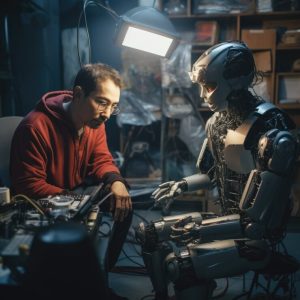
As AI technology advances, its impact on the film industry will only grow. In the future, AI may play a larger role in scriptwriting, potentially even generating entire scenes or movies based on user preferences. Furthermore, AI could enhance virtual and augmented reality experiences, giving viewers new ways to engage with content.
While there are challenges, such as ethical concerns and the potential for job displacement, the benefits of AI in the film industry are undeniable. With careful integration and regulation, AI can complement human creativity, pushing the boundaries of what’s possible in cinema.
Comparative Table: Traditional Methods vs. AI-Enhanced Methods in Filmmaking
| Aspect | Traditional Methods | AI-Enhanced Methods |
|---|---|---|
| Scriptwriting | Written solely by human writers, based on intuition and feedback. | AI tools suggest edits, predict audience response, and improve pacing. |
| Casting | The casting director manually selects based on subjective judgment. | AI uses facial recognition and emotional analysis for accurate actor-role matching. |
| Special Effects | Manual animation and effects with time-intensive rendering. | AI accelerates VFX creation, providing realistic, lifelike character rendering and de-aging effects. |
| Editing | Extensive manual review and time-consuming cut adjustments. | AI analyzes footage, suggests key scenes, and automates repetitive editing tasks. |
| Sound Design | Manual sound editing with careful scene matching and synchronization. | AI suggests soundtracks, enhances audio quality, and automates sound adjustments. |
| Marketing & Distribution | Relies on generalized campaigns and past data to plan release. | AI identifies trends, suggests personalized campaigns, and optimizes distribution timing and platforms. |
Analysis Table: AI’s Impact on Various Film Industry Processes
| Process Area | AI Applications | Positive Impact | Limitations |
|---|---|---|---|
| Scriptwriting | Natural Language Processing (NLP) for analyzing and generating scripts | Faster, audience-driven script drafting. | Potential loss of creative spontaneity. |
| Casting | Facial and emotional recognition, talent matching | Speeds up casting; better alignment of actors to roles. | Reduces subjective, creative casting decisions. |
| Special Effects | Deep Learning for animation and de-aging | Produces lifelike effects; faster creation of complex VFX. | It requires significant data and expertise and can be costly. |
| Editing | Scene analysis, automated cut suggestions | Streamlines editing process; reduces manual workload. | Limited to AI’s programmed capabilities, it lacks artistic touch. |
| Sound Design | Soundtrack matching, audio enhancement | Faster, more immersive soundscapes simplifies sound mixing. | Limited sound options, especially in unique scenes. |
| Marketing & Distribution | Audience trend analysis, targeted ad suggestions | More effective, tailored campaigns; better reach and ROI. | Raises data privacy concerns for audience targeting. |
Conclusion
AI is reshaping the film industry from start to finish, enhancing storytelling, production quality, and audience engagement. While AI offers efficiency and insights, the balance between technology and creativity remains crucial. As AI continues to advance, filmmakers must find ways to blend AI-driven tools with their creative instincts to tell meaningful stories.






